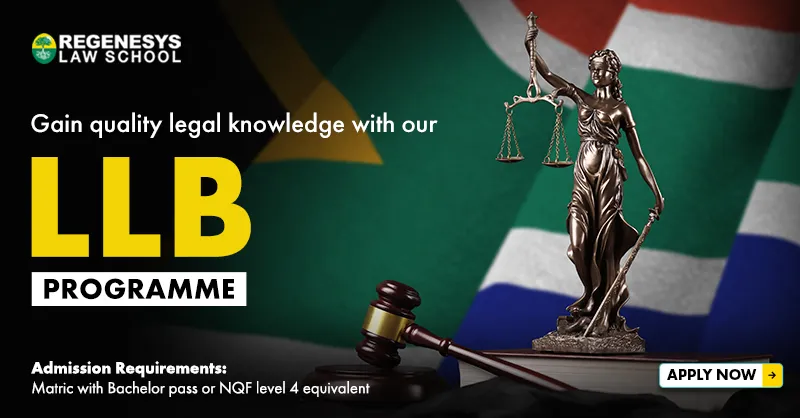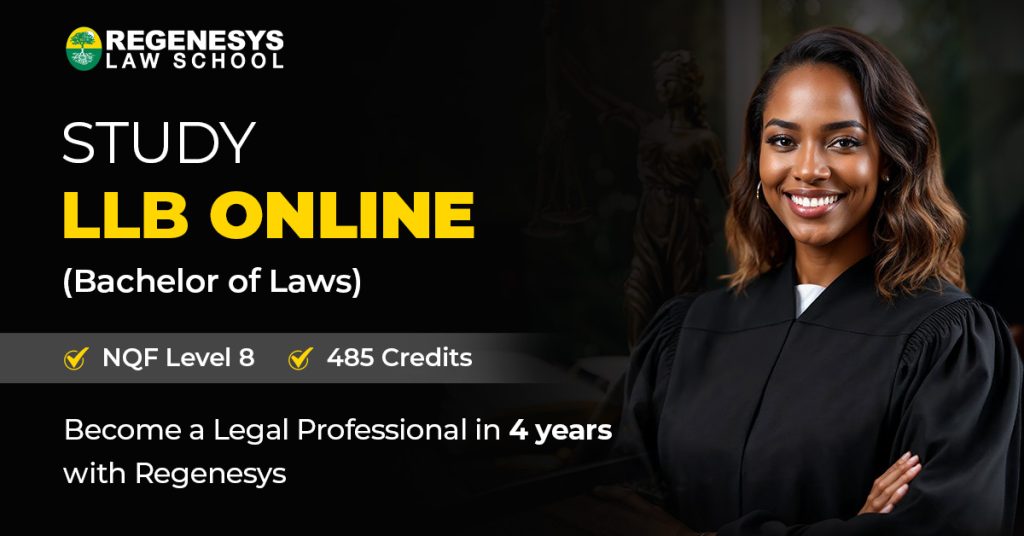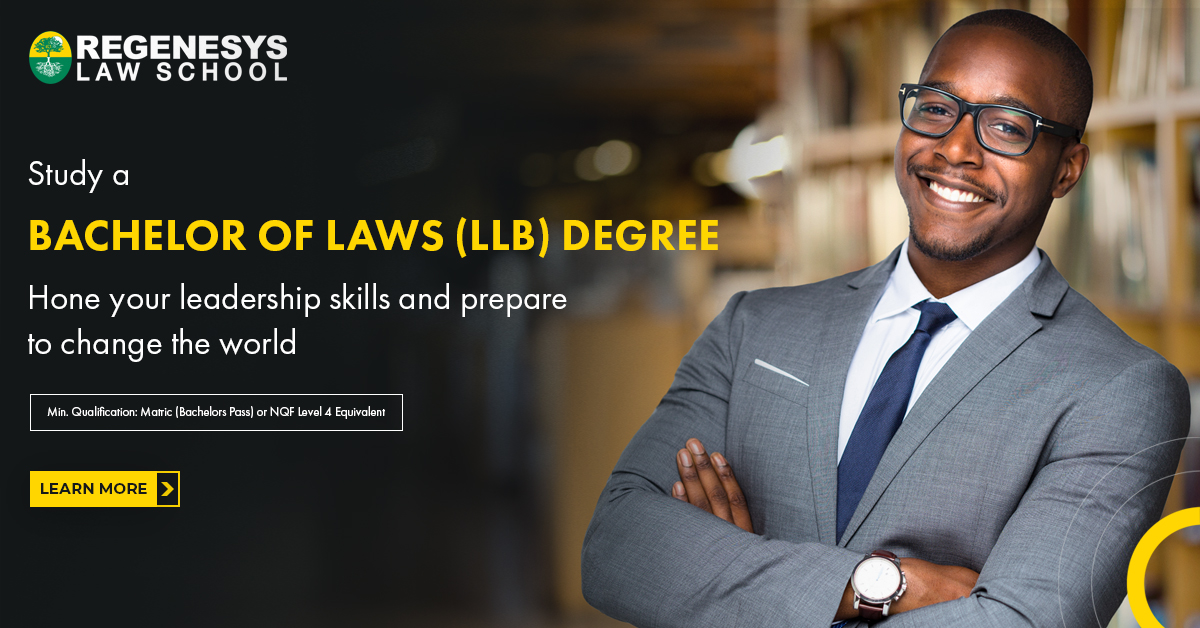A law degree in South Africa is more than just a qualification for practising law; it is a career path that opens doors to diverse and influential opportunities. Lawyers have historically played crucial roles in shaping societies by supporting justice and protecting the rights of individuals and communities.
Ever thought about changing the world? A remarkable number of world leaders have been lawyers who have gone on to do just that. More than half the US’s 44 presidents to date held a law degree. Others include South Africa’s Nelson Mandela, India’s Mahatma Gandhi, Margaret Thatcher (a former tax lawyer) and Tony Blair of the UK, as well as China’s Xi Jinping. (Cuba’s Fidel Castro studied law but did not finish his doctorate.)
And then there’s South Africa’s Mervyn King SC, whose work on good governance and the triple bottom line has changed accountability for big business and governments worldwide, shifting the focus from profit for a few to responsibility for sustainability and equitable prosperity for all.
In this article, we will explore different careers in law in South Africa and job opportunities for graduates.
Table of Contents
- What is a Law Degree in South Africa?
- Careers in Law in South Africa
- Types of Law Careers in South Africa
- Who is regarded as a legal practitioner
- What your LLB degree must cover
- Top Job Opportunities for Law Graduates
- How to Pursue Legal Careers in South Africa?
- Conclusion
- Careers in Law in South Africa: What Can I Do With a Law Degree? – FAQs

What is a Law Degree in South Africa?
A law degree provides a comprehensive understanding of legal principles, equipping graduates with the skills needed to practice law. As a result, it prepares them to find their way through the legal landscape. In South Africa, the structure and curriculum of law programmes, particularly the Bachelor of Laws (LLB), are designed to provide a thorough legal education that prepares graduates for various roles in the legal profession. Here is a brief overview of the structure of law programmes:
LLB (Bachelor of Laws):
The LLB is typically a four-year undergraduate degree. It serves as the foundational qualification for entering the legal profession. The structure of the LLB programme often includes:
|
Core Modules |
Electives |
|
|
Postgraduate Options:
After obtaining an LLB, graduates can pursue further studies, such as:
- Master of Laws (LLM): This advanced degree involves focused research and coursework in specialised areas of law, ideal for those seeking to deepen their expertise and engage in high-level legal analysis.
- Doctor of Laws (LLD): This doctoral degree, which involves extensive research and a dissertation, is aimed at those interested in academic or high-level legal research careers.
If you want to enrol in law programmes like the LLB (Bachelor of Laws), Regenesys Law School is one of the top choices in South Africa. Our LLB programme is designed to equip graduates with the knowledge and expertise needed to excel in diverse legal careers. Moreover, we prepare our students to tackle the evolving challenges of the legal profession.
Careers in Law in South Africa
According to the Law Society of South Africa (LSSA), South Africa’s umbrella professional body for legal practitioners, South Africa has about 30,000 practising attorneys and nearly 6,000 candidate attorneys.
Most, in their law careers, have acquired skills such as public speaking and debate, inductive reasoning, coping with stress, and have deep integrity – all important leadership skills and traits. It should not be surprising, then, that so many global leaders have started out as lawyers.
Types of Law Careers in South Africa
A law degree opens up many career options, each with its own set of challenges and rewards. Hence, whether you are interested in working in the courtroom or exploring specialised fields, a legal career in South Africa offers various paths. Knowing about these different types of law careers can help you find the one that fits your interests and goals. The following are the types of law careers you will find with a law degree in South Africa:
Traditional Legal Careers
Traditional legal careers are often the first that come to mind for those considering getting a law degree. These roles typically involve helping clients, understanding laws, and playing a part in the justice system. Here is a quick overview of some common traditional legal careers:
- Attorney: Attorneys, or lawyers, give legal advice, represent clients in court, and handle legal issues. They can work in private practices, government, or corporate settings.
- Advocate: Advocates focus on representing clients in higher courts. They are experts in litigation and are typically hired by attorneys who manage client relationships and preparation.
- Judge: Judges oversee court cases, make decisions based on the law, and ensure fair trials. They are essential for upholding justice and the rule of law.
In addition to these traditional roles, you can explore specialised fields in law, such as Corporate Law, Environmental Law, Intellectual Property Law, Criminal Law, and Family Law. Each of these areas offers unique opportunities to impact various sectors.
Who is regarded as a legal practitioner
Anyone who earns a living from practising law is a lawyer, or legal practitioner – judges, attorneys, advocates, magistrates, prosecutors, notaries, conveyancers, academics, and legal advisors to private and public institutions. So what do they do?
Attorneys and advocates
- Attorneys and advocates are lawyers who have permission from the High Court to:
- Represent people in court or at tribunals, or other similar bodies;
- Draw up or execute documents relating to or for use in legal proceedings;
- Provide legal advice; and
- To be paid for doing so.
(Salmon, 2020)
Attorneys may provide services in one or two specialised fields such as commercial property, tax, corporate and business law, civil or criminal law, intellectual property law, maritime law, or across a range of fields, say family, matrimonial, and divorce law. These services generally relate to administrative and preparatory work in litigation (Wildenboer, 2010). They are first in the line of protection for anyone who has a legal problem and needs help. They may also work in commerce, overseeing contracts and advising organisations to ensure that they operate within the law, and in complex situations such as mergers and acquisitions and international trade.
Advocates are masters of argument, have specialist forensic skills (Wildenboer, 2010) and represent clients in the High Court. They may not appear in court unless they have been briefed by an attorney. Until recently only advocates were permitted to represent clients in the High Court, but now attorneys with three years’ experience may also appear in the High Court (LSSA, 2022).
Notaries
Notaries – more properly, notaries public – specialise in drafting, legalising and authenticating documents such as power of attorney, marriage status, articles of incorporation and commercial invoices, certifying background checks, and witnessing deeds of cession of usufruct and deeds of servitude, among other things.
Conveyancers
Conveyancers are attorneys who specialise in the transfer of immovable property. They are the only professionals permitted by law to prepare and execute such deeds for registration in the deeds registry. They must be conversant with all land registration legislation, common law and conference resolutions, and are duty-bound to protect the interests of their clients.
Before you can become a conveyancer, you must be admitted to practice as an attorney.
Admission as an attorney
To be permitted to practice as an attorney – an officer of the court – you must:
- Be 21 or older;
- A South African citizen or permanent resident;
- Hold a four-year Bachelor of Laws (LLB) degree from South Africa or, if qualified in another country, hold five-year equivalent law degree recognised by the South African Qualifications Authority;
- Have completed practical vocational training requirements as a candidate legal practitioner, serving 24 months as an articled clerk or in a law clinic community service contract;
- Have completed a practice management course; and thereafter
- Pass the Legal Practice Council attorney’s admission examination; and
- Be regarded by the Law Society and the High Court as a “fit and proper person” – an honest person of proven integrity (Law Society of South Africa, 2016).
Admission as an advocate
To register as advocates, you would need to fulfill the same requirements as attorneys, but instead of writing an attorney’s admission exam write an advocate’s admission exam, and indicate to the High Court whether you intend to practice with or without a Fidelity Fund certificate.
To be admitted to a bar association – a society that provides support and fraternity for advocates, who consider their livelihood a calling rather than a profession – you would have to serve a year’s pupillage (apprenticeship), in which you would be prepared by an experienced advocate “for the rigours of practice” and coached in professional standards, ethics, integrity and conduct (PSA, 2022).
What your LLB degree must cover
It’s worth noting that – no matter what you eventually intend to specialise in – the LSSA requires your LLB degree to cover:
- Constitutional practice;
- Professional legal ethics;
- Personal injury claims;
- High court practice;
- Magistrate’s court practice;
- Criminal court practice;
- Labour dispute resolution;
- Alternative dispute resolution
- Attorneys’ bookkeeping;
- Wills and estates;
- Matrimonial law;
- Legal costs;
- Drafting contracts;
- Information and communication technology for your practice, and associated aspects of cyber law; and
- Introduction to practice management.
(LSSA, 2022)
Note that as an advocate, you will practice alone. Attorneys, however, may open their own practices, join firms as professional, junior or senior attorneys or advisors, or teach law. While some may go on to become judges, all will work to ensure that justice is served … and help to change the world.
Top Job Opportunities for Law Graduates
If you want to work directly with clients, influence corporate strategies, shape public policy, or do more, a law degree in South Africa offers many career options. Understanding the different employment sectors and the skills in demand can help you find the right path in the legal field.
Employment Sectors for Law Graduates
As a law graduate, you can explore a variety of career paths across several sectors. For instance, for private practice, you might work in law firms, providing legal services to individuals and businesses. Meanwhile, in the corporate sector, you deal with legal issues related to company operations, contracts, and compliance within businesses. In the government and public sector, you can focus on regulatory compliance and public policy in various government agencies. Finally, academia and researchprovide opportunities for teaching and researching law at universities. Each sector offers unique opportunities to apply your legal expertise.
In-Demand Skills for Law Graduates
As you explore career opportunities in the legal field, certain skills are essential for success. It enables you to handle complex legal issues and ensure you can contribute meaningfully to the legal profession. Besides, acquiring these skills helps you stand out in a competitive job market and excel in various legal roles. The following are the key skills required for law graduates:
- Analytical Thinking
- Effective Communication
- Research Proficiency
- Negotiation and Mediation
- Problem-Solving
- Attention to Detail
- Ethical Judgment
How to Pursue Legal Careers in South Africa?
To become an attorney, you must be at least 21 years old, a South African citizen or permanent resident, and hold a law degree in South Africa. After receiving your degree, you must complete practical training. You also need to pass a practice management course and the Legal Practice Council’s admission exam. Finally, you must be considered a “fit and proper person” by the Law Society and the High Court.
On the other hand, becoming an advocate involves similar initial steps but with additional requirements. You need to pass an advocate’s admission exam and decide whether to practice with or without a Fidelity Fund certificate. You also have to complete a year’s pupillage under an experienced advocate, gaining hands-on experience and learning professional standards. Additionally, joining a bar association that supports advocates is an important part of this career path.

Conclusion
Starting a legal career in South Africa offers many opportunities and paths to follow, each suited to different interests and goals. Whether you want to become an attorney or advocate or work in areas like corporate or environmental law, a law degree in South Africa sets you up for a varied and impactful career. In other words, you will find many fields to explore in law, from private practice and corporate roles to government and teaching. Hence, to succeed, focus on developing key skills like analytical thinking, clear communication, and ethical judgment.
Ready to start your legal career? Enrol in Regenesys Law School’s Bachelor of Laws (LLB) programme to gain the skills and knowledge for success in the legal field. Apply now!
References
- Law Society of South Africa. (2016). Career Guide to the Legal Profession.
- Law Society of South Africa. (2022). Becoming a legal practitioner.
- Salmon, O. (2020). Law Made Simple.
- Pretoria Society of Advocates (PSA), 2022. Advocacy as a career.
- Wildenboer, L. (2010). The origins of the division of the legal profession in South Africa: a brief overview. Fundamina 16(2) 199-225.
Careers in Law in South Africa: What Can I Do With a Law Degree? – FAQs
What are the types of law careers in South Africa?
You can pursue various careers in law in South Africa as an attorney, advocate, or judge. Specialisations like Corporate Law, Environmental Law, and Intellectual Property Law also offer diverse opportunities.
What are the job opportunities available for law graduates in South Africa?
As a law graduate, you can work in private practice, corporate legal departments, government agencies, or academia. Positions include roles in legal firms, compliance, public policy, and teaching or research.
How can I start a legal career in South Africa?
To start a legal career, first earn a law degree in South Africa. To become an attorney, complete practical training and pass the admission exam. On the other hand, if you want to become an advocate, pass the admission exam, complete pupillage, and join a bar association.
What skills are important for a successful legal career in South Africa?
Essential skills include analytical thinking, effective communication, research proficiency, negotiation, problem-solving, attention to detail, and ethical judgment. These skills are crucial for various legal roles.
What postgraduate options are available after completing an LLB in South Africa?
After an LLB, you can pursue a Master of Laws (LLM) for specialisation or a Doctor of Laws (LLD) for advanced research and academic careers.










6 Comments
I like this website very much, Its a very nice post to read and receive info.Money from blog
Wonderful blog! I found it while surfing around on Yahoo News. Do you have any suggestions on how to get listed in Yahoo News? I’ve been trying for a while but I never seem to get there! Appreciate it
Hello are using WordPress for your blog platform? I’m new to the blog world but I’m trying to get started and create my own. Do you need any coding knowledge to make your own blog? Any help would be greatly appreciated!
This really answered my downside, thank you!
Aided me a lot, just what I was searching for : D.
Hmm it looks like your website ate my first comment (it was super long) so I guess I’ll just sum it up what I wrote and say, I’m thoroughly enjoying your blog. I as well am an aspiring blog blogger but I’m still new to the whole thing. Do you have any suggestions for rookie blog writers? I’d really appreciate it.